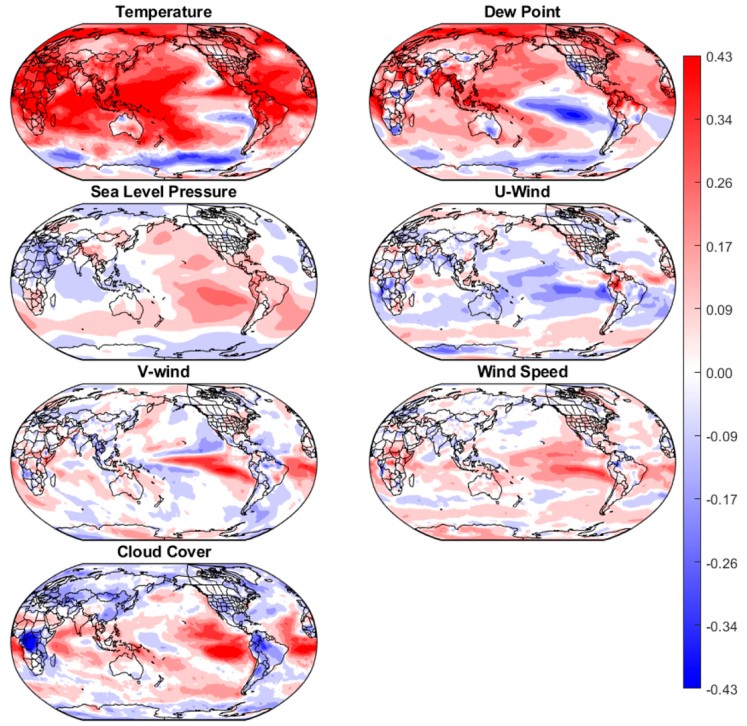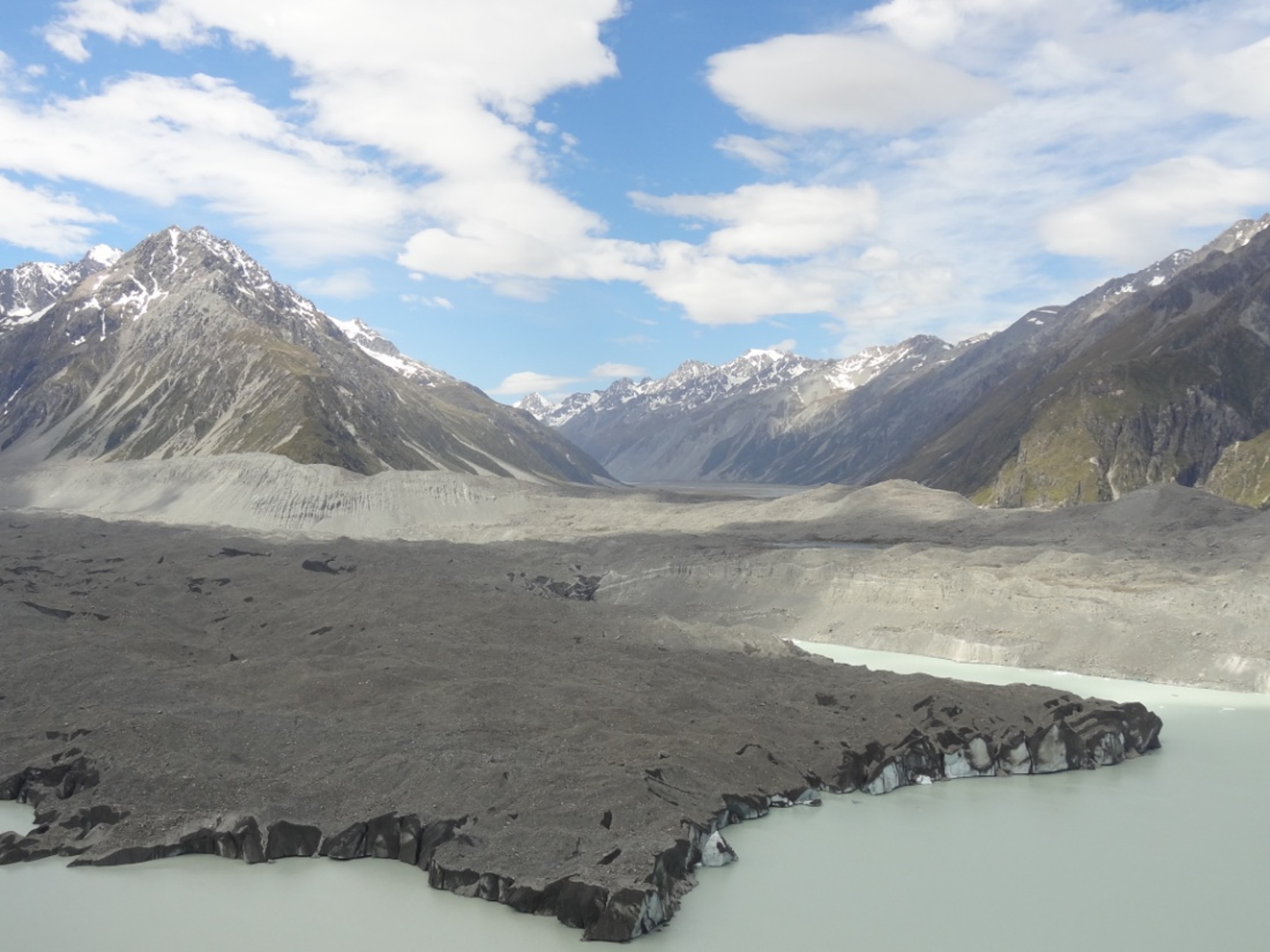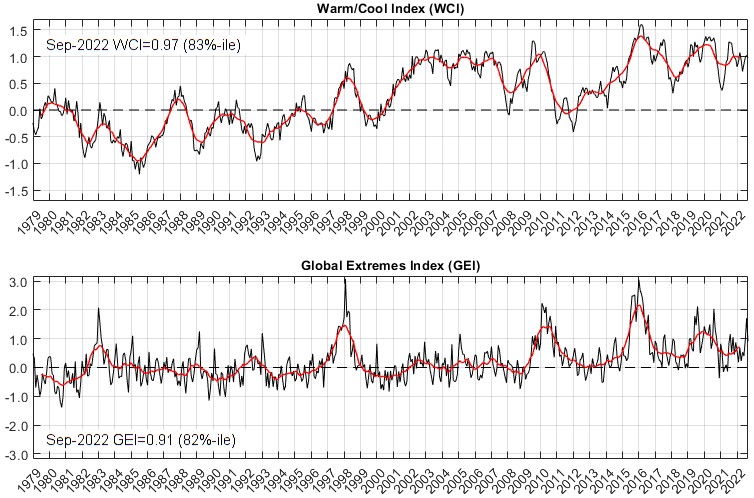Climate Change

Climate change is real, it is caused by humans, and it is the single biggest environmental issue of our time.
As climate scientists at an R1 research university, we take a keen interest in the physical science behind climate change, along with the mitigation- and adaptation-based solutions. However, the majority of our research on the topic focuses on the impacts of climate change. At various times, we have been funded by NASA, NOAA and other state-based agencies to explore historical trends in climate change indicators, and make projections of future impacts.
One recent area of interest is in non-traditional indicators of climate change. We have explored how synoptic-scale air masses are changing in frequency across the globe, including what the driving factors are behind these changes. We have investigated how extreme temperature events are changing in frequency, duration and spatial extent, and how higher-order statistical properties (e.g. variability, skewness, and kurtosis) are changing over time. Prior research examined trends in water clarity over time, projected heat-related deaths in major California cities through 2100, and estimated future impacts on U.S. tornadoes.
Research on these topics have been highlighted in major international climate journals and the cited in the Intergovernmental Panel on Climate Change (IPCC)’s 6th Assessment Report (in Chapter 11 on Weather and climate extreme events in a changing climate).
In addition to the research being done in the ClimRISE Lab, the Department of Geography is also the home of the minor in Climate Change, and offers a combined senior- and graduate-level course on Global Climate Change every semester. Dr. Lee and Dr. Sheridan have also shared their knowledge on climate change with various media outlets and local groups, and are always open for community outreach on this important topic.
Published Research on Climate Change
- Obarein, O.A., Lee, C.C. (2022): Differential Signal of Change Among Multiple Components of West African Rainfall. Theoretical and Applied Climatology 149, 379-399. DOI: 10.1007/s00704-022-04052-1.
- Ilias, P., Kassomenos, P., Lee, C.C. (2022): Trends in airmass frequencies across Europe. Theoretical and Applied Climatology 148, 105-122. DOI: 10.1007/s00704-022-03921-z.
- Lee, C.C. (2021): Weather Whiplash: Trends in rapid temperature changes in a warming climate. International Journal of Climatology 42(8), 4214-4222. DOI: DOI:10.1002/joc.7458.
- Smith E.T., Obarein, O., Sheridan, S.C., Lee, C.C. (2021): Assessing trends in atmospheric circulation patterns across North America. International Journal of Climatology 41(4), 2679-2692. DOI: 10.1002/joc.6983.
- Lee, C.C., Obarein, O., Sheridan, S.C., Smith, E.T., Adams, R.E. (2021): Examining trends in multiple parameters of seasonally-relative extreme temperature and dew point events across North America. International Journal of Climatology 41(S1), E2360-E2378. DOI:10.1002/joc.6852.
- Lee, C.C., Barnes, B.B., Sheridan, S.C., Smith, E.T., Hu, C., Pirhalla, D.E., Ransibrahmanakul, V., Adams, R.E. (2020): Using Machine Learning to Model Water Clarity in the Great Lakes. Journal of Great Lakes Research 46(6), 1501-1510. DOI: 10.1016/j.jglr.2020.07.022.
- Lee, C.C. (2020): Trends and variability in air mass frequencies: indicators of a changing climate. Journal of Climate 33(19), 8603-8617. DOI: 10.1175/JCLI-D-20-0094.1.
- Sheridan, S.C. Lee, C.C., Adams, R., Smith, E.T., Pirhalla, D.E., Ransibrahmanakul, V. (2019): Temporal modeling of anomalous coastal sea-level values using synoptic climatological patterns. Journal of Geophysical Research: Oceans 124(9), 6531-6544. DOI: 10.1029/2019JC015421.
- Lee, C.C., Sheridan, S.C. (2018): Trends in weather type frequencies across North America. npj Climate and Atmospheric Science 1(41). DOI: 10.1038/s41612-018-0051-7.
- Sheridan, S.C., Lee, C.C. (2018): Temporal trends in absolute and relative extreme temperature events across North America. Journal of Geophysical Research: Atmospheres 123(21), 11889-11898. DOI: 10.1029/2018JD029150.
- Lee, C.C., Sheridan, S.C., Barnes, B.B., Hu, C., Pirhalla, D.E., Ransibrahmanakul, V., Shein, K. (2016): The development of a non-linear auto-regressive model with exogenous input (NARX) to model climate-water clarity relationships: reconstructing an historical water clarity index for the coastal waters of the southeastern US. Theoretical and Applied Climatology 130(1-2), pp.557-569. DOI: 10.1007/s00704-016-1906-7.
- Lee, C.C. (2012): Utilizing Synoptic Climatological Methods to Assess the Impacts of Climate Change on Future Tornado-Favorable Environments. Natural Hazards 62(2), 325-343. DOI: 10.1007/s11069-011-9998-y.
- Sheridan, S.C., Allen, M.J., Lee, C.C., Kalkstein, L.S. (2012): Future heat vulnerability in California, Part II: Projecting future heat-related mortality. Climatic Change 115(2), 311-326. DOI: 10.1007/s10584-012-0437-1.
- Sheridan, S.C., Lee, C.C., Allen, M.J., Kalkstein, L.S. (2012): Future heat vulnerability in California, Part I: Projecting future weather types and heat events. Climatic Change 115(2), 291-309. DOI: 10.1007/s10584-012-0436-2.
- Lee, C.C., Sheridan, S.C. (2011): A Six-Step Approach to Developing Future Synoptic Classifications Based on GCM Output. International Journal of Climatology 32, 1792-1802. DOI: 10.1002/joc.2394.




